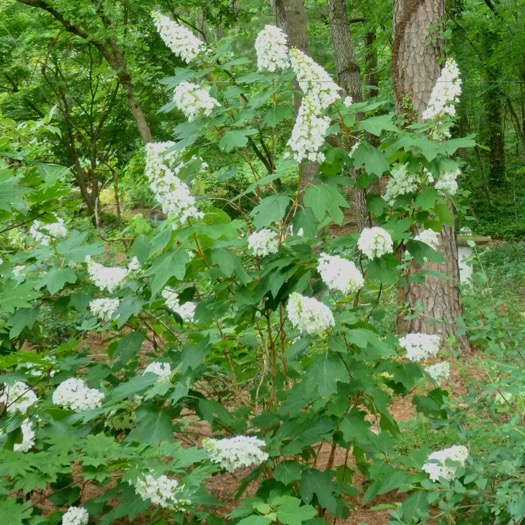Does a Snowflake Hydrangea (Hydrangea quercifolia 'Snowflake') grow in your garden? If so, you may be interested in its rather remarkable history. This is one of several Snowflake Hydrangeas that grow in my woodland garden. Now in its third year since planting, it has prospered.
This is one of several Snowflake Hydrangeas that grow in my woodland garden. Now in its third year since planting, it has prospered.
Aldridge Gardens in Hoover, Alabama, is noted for its hydrangeas, especially the Snowflake Hydrangea, an oakleaf hydrangea whose white blooms are double and last far longer than the species, shading beautifully to pink as they age.  Here is a close-up of the Snowflake's double blooms.
Here is a close-up of the Snowflake's double blooms.
 This is a photo taken in a previous year in July at Aldridge Gardens, as the Snowflakes took on their lovely pink hues.However, most people are unaware of the interesting history associated with this beautiful Alabama native. I was privileged to serve on the Board of Aldridge Gardens with its founder, Eddie Aldridge, who passed away in November 2018. Mr. Aldridge told me about the Snowflake and a little-known bit of history associated with it.
This is a photo taken in a previous year in July at Aldridge Gardens, as the Snowflakes took on their lovely pink hues.However, most people are unaware of the interesting history associated with this beautiful Alabama native. I was privileged to serve on the Board of Aldridge Gardens with its founder, Eddie Aldridge, who passed away in November 2018. Mr. Aldridge told me about the Snowflake and a little-known bit of history associated with it.
Eddie Aldridge and his father, Loren, introduced the Snowflake Hydrangea to the world in the 1970s, after they began propagation and patented it.
A friend had told Loren about an unusual hydrangea in a lady’s backyard, and Loren asked to see the shrub. Unfortunately, the plant was dying. Loren managed to obtain three cuttings. He brought them to his nursery and was able to root them. But one day a nursery worker mistook the little plants for weeds and threw them into the dumpster!
Eddie came in later that afternoon. When he discovered what had happened, he sent the hapless nursery worker headfirst into the dumpster to retrieve the plants. Only one survived; and since the mother plant had meanwhile perished, there were no more to be had.
The new hydrangea was sterile, so any new plants had to be grown from cuttings. The surviving plant prospered, and over the next year Loren rooted thirteen new cuttings. These thirteen hydrangeas were planted by the waterfall at Aldridge Gardens. Eventually, the Aldridges propagated enough plants to begin marketing. Eddie and Loren named the shrub ‘Snowflake’ and obtained a patent so they could publicize the plant. They never charged royalties or sought monetary gain, but only wanted to share this unique hydrangea with the world.
About 1990, an ad featuring the Snowflake in the American Nursery Magazine created a stir in the nursery world. Eddie’s cousin Arthur, who ran the Aldridge nursery near Boaz, sold a large number to the West Coast, and the Rockefeller Foundation soon requested a huge quantity for New York City, including Central Park. Arthur did not recognize the name of this “outfit” from New York and demanded they pay cash! (Which they did.)  This is a photo of Eddie Aldridge, taken by his wife Kay, in New York's Central Park with some Snowflake hydrangeas.
This is a photo of Eddie Aldridge, taken by his wife Kay, in New York's Central Park with some Snowflake hydrangeas.Snowflake Hydrangeas, like all oakleaf hydrangeas, have beautiful fall foliage. They also have interesting structure that is a highlight in the winter garden. Snowflakes are truly a four season plant.
A Frenchman named Andre Briant began propagation of the Snowflake in the 1990’s and featured them in his international trade magazine. Before long he was selling them all over the world. Snowflake Hydrangeas now grow in Butchart Gardens near Victoria, Canada and in the New York Botanical Gardens. They grow from New Zealand to England and France, to China and Japan. And all of these many plants growing over the world, including any you happen to be growing in your garden, can be traced back to the single plant that survived its dangerous trip into the dumpster!